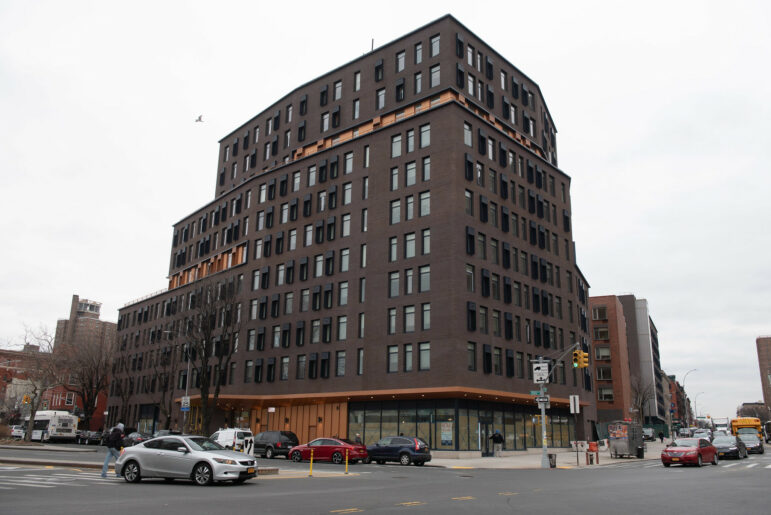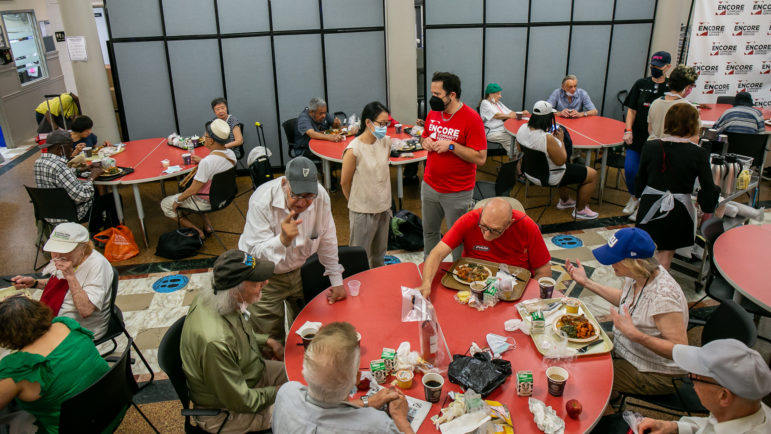
Katia Chapman
On the march to Albany.
Many grocery shoppers in New York often look for labels like “organic,” “fresh,” and “free range” on their eggs, milk, vegetables and fruits to protect their health and reconnect with nature. But they rarely think about the human cost of what they are eating.
And farmworkers, who arrived in Albany Wednesday after marching during 18 days and 200 miles from New York Senate majority leader John Flanagan’s office in Smithtown, Long Island, to the steps of the state capitol, say they want to remind New Yorkers that food not only feeds your body, but it can also empower you morally and socially to defend your rights.
“This is a good cause for undocumented farmworkers like us,” says José Ventura—a Guatemalan immigrant who works in landscaping and at a potato processing plant. “They don’t pay us overtime. We don’t have vacation pay. And they don’t allow us to organize and defend our rights like a union.”
While New York State’s farm industry was worth $5.4 billion in 2012, workers are excluded from the basic rights protected by the NY State constitution and labor laws.
“This is really a legacy of Jim Crowe,” says Margaret Gray—a political science professor at Adelphi University who is an expert on farmworkers. “It was during the New Deal period when the legislation was put in place at the federal level that southern democrats did not want to extend labor rights to black workers [at the time, many black workers migrated seasonally from Florida to NY farms.] So farmworkers and domestic workers were left out of the labor legislation.”
Since the 1930s, states like California granted farmworkers labor protections. And now in New York, state leaders like Sen. Adriano Espaillat (D- Bronx) and Assembly Member Catherine Nolan (D- Queens) are sponsoring a Farmworkers Fair Labor Practices bill that would grant collective bargaining rights for laborers, mandate overtime and one rest day per week, as well as other provisions that are standard in unemployment and sanitary laws.
Advocates for NY State farms, however, argue that giving workers the right to unionize could jeopardize the work of an entire season, if they chose to strike at the peak moment of a harvest. They also maintain that raising worker wages will drive up food prices and cut into narrow profit margins that make farms sustainable.
Gray explains that while many farmworkers are not victims of abuse, their exclusion from basic labor rights has created a two-tier system. “Hardships come out of extreme disparity between the workers and their employers,” she says. “And this disparity is shaped by legal status, race, education and English-language abilities, which pressure workers not to take breaks, ask for raises and defend their rights.”
Farmworkers today are largely undocumented Latino immigrants. And many of them feel trapped in the United States since border security has become more restrictive.
This is the case of Heriberto González, an undocumented farmworker who works 75 hours per week on a vegetable farm to support his parents and three sisters in Mexico. “Originally I only wanted to immigrate [to the U.S] for three years. Save money. And return to Mexico to finish school,” he tells City Limits. “Now I haven’t seen my family in 7 years. I don’t have a plan anymore… My legal status limits everything.”
Immigration policy restrictions have led undocumented workers to settle down in farms year-round because low wages and psychological pressures of getting deported have made migration difficult. In spite of his status, González was able to negotiate work hours and get a pay raise of $1 per hour after working four years on a farm. But he had to leave his job for one year to pressure his employer. And other workers have not been as lucky.
Jesús Camacho, an undocumented immigrant from Guatemala, suffered multiple injuries while working on a dairy farm. And after hurting his left arm, the Guatemalan immigrant had to seek legal and medical to help cover surgery and living expenses. Camacho’s employer, like many other farmers, does not pay wages to employees when they are sick or recovering from injury.
“My boss didn’t want to take me to the doctor during any of my injuries,” Camacho said. “Bosses treat us like work machines. And not like people. They need to understand that farmers are nothing without Latino workers. And Latinos are nothing without farmers. So we need to find a union with dignity and respect.”








